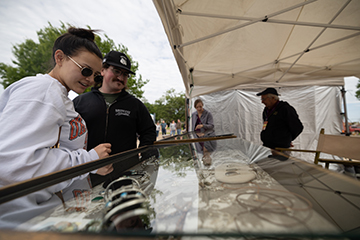Department of Statistics
Statistics
Our Programs
Undergraduate Studies
The undergraduate program in statistics is an ideal choice for the person who is intrigued by mathematics, computing and problem solving. Since statistics is used as a decision-making tool in so many areas, it is an ideal combination for a double major or as a preparation for graduate school.
Graduate Studies
The department offers master's and doctoral degrees requiring a strong foundation in mathematics. You will experience both applied and theoretical classes.
Online Master's Degree
For those working full-time or who live outside of Stillwater, there is an online degree option for you. Earn a Master's of Science in Applied Statistics entirely online.
About Us
Make An Impact
Gifts to OSU have created more than 2,500 scholarship funds, benefitting thousands of students for generations. Make your impact today!


